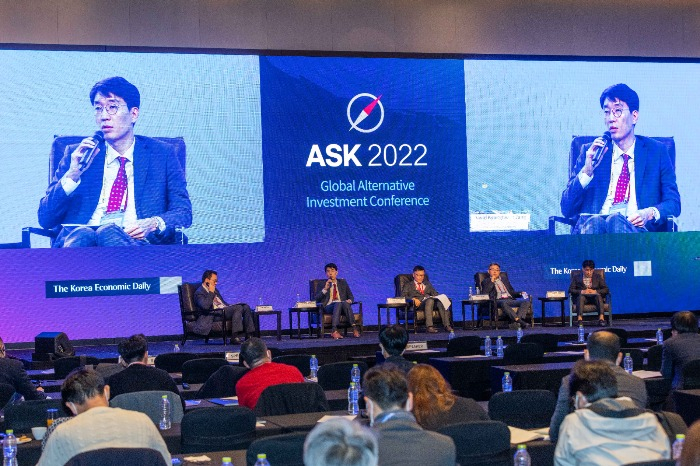ASK 2022
NPS considers new investment in global real estate
The world's 3rd-largest pension fund eyes short-term rent hikes while looking to long-term steady cash flow, American RE head says
By Oct 26, 2022 (Gmt+09:00)
1
Min read
Most Read
LG Chem to sell water filter business to Glenwood PE for $692 million


Kyobo Life poised to buy Japan’s SBI Group-owned savings bank


KT&G eyes overseas M&A after rejecting activist fund's offer


StockX in merger talks with Naver’s online reseller Kream


Mirae Asset to be named Korea Post’s core real estate fund operator



South Korea’s National Pension Service (NPS) is open to new investments in overseas real estate, the pension fund’s American real estate head Jang Kyung-hwan said at ASK 2022, The Korea Economic Daily’s biannual conference on alternative investments.
The pension fund’s alternative investment is still within the extent of its mid-term asset allocation scheme, meaning it will inject more capital into real assets, private equity and debt.
The world’s third-largest pension fund manages 882.7 trillion won ($614.1 billion) in assets as of end-June, including alternative assets making up 15%. Real estate accounts for 4.9% of its entire assets under management.
The pension fund’s ticket size ranges from $150 million to $300 million for each commingled fund, and from $300 million to $500 million for each special memorandum account (SMA).
Jang said certain real estate sectors are expected to benefit from demographic and market structural changes in the mid to long term although he didn’t specify the sectors.
On global real estate, the pension fund is also considering betting on rent hikes in the short term while looking for a steady stream of cash flow in the long term, he added.
In August, NPS announced it had an 8% negative return during the first six months of this year, with its AUM dropping around 7% from 948.7 trillion won as of end-2021. The loss came from the reduction of the Federal Reserve’s balance sheet and global supply chain disruptions, the pension fund said.
It saw a negative internal rate of return from domestic and overseas equity and debt during the first half of this year. The alternative asset class was the only class to achieve a positive return, 7.25%. However, the gains are highly likely to be lowered after reflecting the assets’ fair market value at the end of this year.
Write to Jihyun Kim at snowy@hankyung.com
Jennifer Nicholson-Breen edited this article.
More to Read
-
 Real estateMirae Asset to be named Korea Post’s core real estate fund operator
Real estateMirae Asset to be named Korea Post’s core real estate fund operatorApr 29, 2025 (Gmt+09:00)
-
 Asset managementMirae Asset bets on China as Korean investors’ US focus draws concern
Asset managementMirae Asset bets on China as Korean investors’ US focus draws concernApr 27, 2025 (Gmt+09:00)
-
 Alternative investmentsMeritz backs half of ex-manager’s $210 mn hedge fund
Alternative investmentsMeritz backs half of ex-manager’s $210 mn hedge fundApr 23, 2025 (Gmt+09:00)
-
 Real estateRitz-Carlton to return to Seoul, tapped by IGIS Asset for landmark project
Real estateRitz-Carlton to return to Seoul, tapped by IGIS Asset for landmark projectApr 22, 2025 (Gmt+09:00)
-
 Real estateS.Korean gaming giant Netmarble eyes headquarters building sale
Real estateS.Korean gaming giant Netmarble eyes headquarters building saleApr 18, 2025 (Gmt+09:00)
Comment 0
LOG IN


